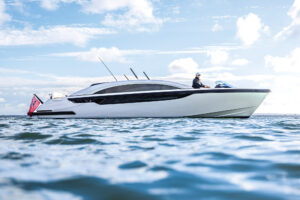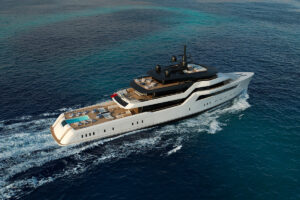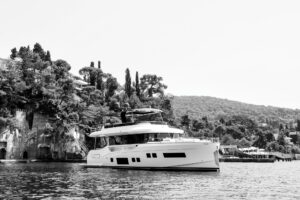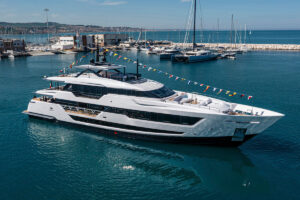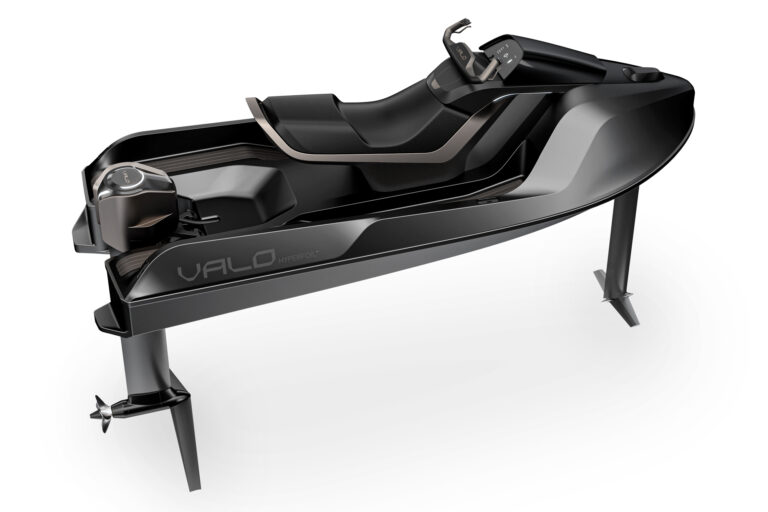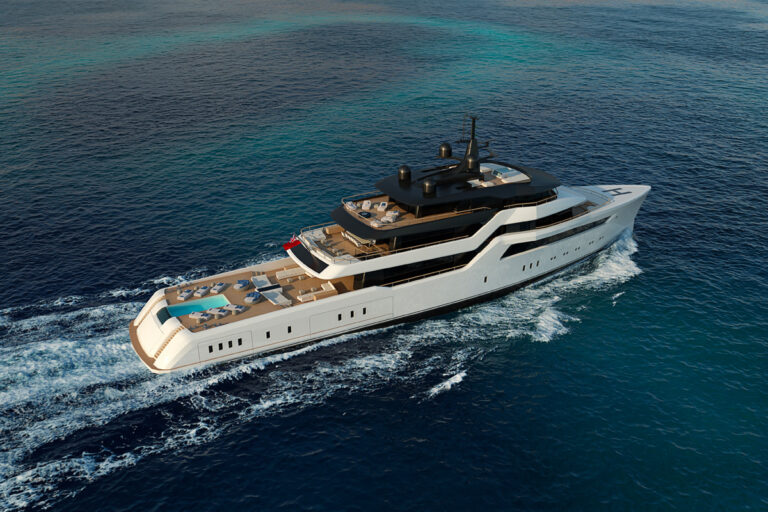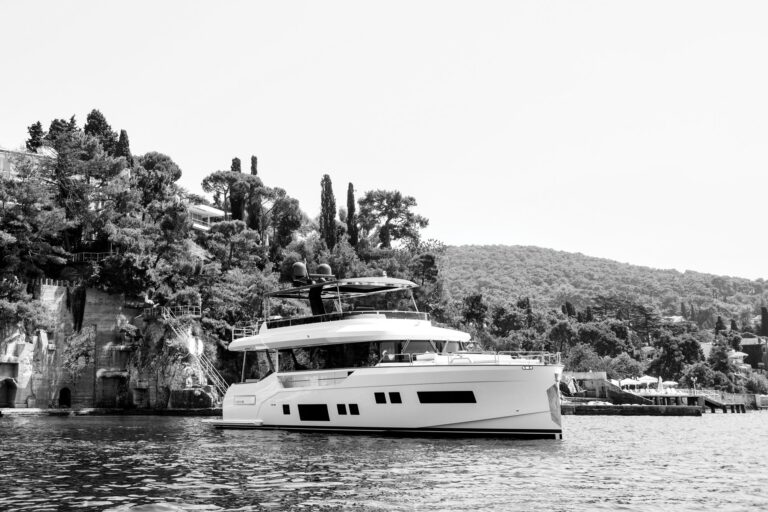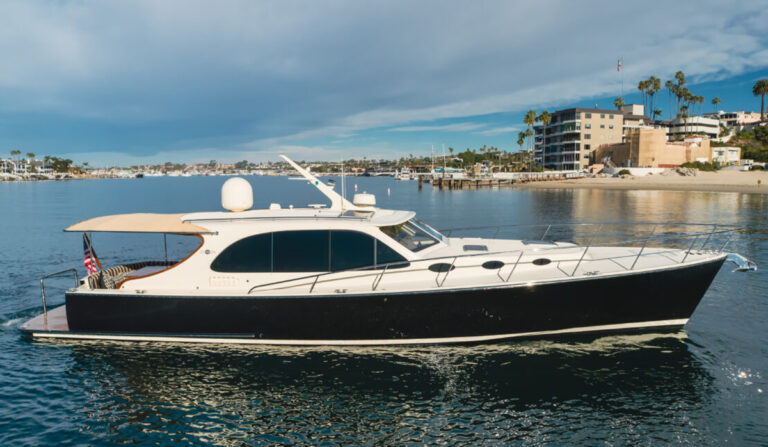While growing up on and in the Chesapeake Bay and its tributary tentacles, I was cursed with a thriving wanderlust. Every summer day, I made my way to the dock for an outing on the aluminum skiff my father had turned over to me. Exploring the backwaters with no destination in mind, I was overrun by images of heading south and exploring the Intracoastal’s Low Country. Soon enough, the dreamy thoughts expanded while cruising the East Coast on larger family craft and spending a few holidays in warmer latitudes. While anchored behind Caya Costa on Florida’s Gulf Coast as a teenager, I sucked in old Yachting articles about Carlton Mitchell’s Pacific exploits on his hefty trawler, Land’s End. I read those stories a dozen times, pausing between paragraphs long enough to transport myself into the middle of Mitchell’s ocean.
Such thoughts have subsided over the years, not in admittance of defeat, but in acceptance of reality. They’re further kept at bay by the occasional opportunity to leave my desk behind for a bluewater adventure that lasts just long enough to help me forget where I put my shoes when it’s time to put them back on.
The wanderlust floodgates were completely opened, however, after spending a day on board the Great Southern 76 off the East Coast of Florida.
Several hours after I left Great Southern’s importer, Joe Johnson, at the dock in Ft. Lauderdale, I continued to pour over sketches, specs and layouts. The Great Southern is designed and equipped like a little ship ready to explore the world’s oceans in relative comfort. If you’re looking for a 76-foot yacht overflowing with luxury accommodations and better suited for dockside living and coastal cruising, don’t even consider this boat.
Each Great Southern is designed and certified to American Bureau of Shipping requirements. Bottom plates are constructed with grade 250 steel that is 8 millimeters thick. Thickness decreases to 6 millimeters on the topsides and increases to 12 millimeters in the propeller tunnels. Solid steel frames are spaced every 500 millimeters. To keep weight down, increase economy of operation and improve stability, the superstructure is built of a tough cored composite.
Unlike a lot of today’s floating gin palaces, the 76 was created from the outside in by designer Gavin Mair. The stability curve shows a capsize angle of nearly 100 degrees. A similar size commercial trawler Mair designed has a capsize angle of about 70 degrees; she’s been in operation for more than two years and experienced one storm of 70-knot winds and 25- to 35-foot seas. The captain hove to, kept the boat in gear at full throttle for four hours and made one nautical mile. That’s proof the 76 comes from good stock.
Her salty profile lends validity to the all-oceans mission. The high bow incorporates fins just below the waterline to reduce pitching in head seas. Skeg-hung rudders enclose the 42-inch, five-blade propellers in their own aperture, protecting the wheels. The stainless-steel rudders and steel skegs will also provide good tracking ability in a following sea.
Exit ports line the deck, ready to dump any green water that comes on board. One noticeable exterior feature is the spruce mast, which Johnson said is intended to serve as a riding sail while at anchor in the rough waters around Great Southern’s western Australia yard. The boom, if equipped with an electric winch, can launch and retrieve the dinghy on either side. If she were my ship, I would eliminate the feature (who still builds spruce masts?) and go with a lower aluminum signal mast accompanied by a davit. The deck would be cleaner, and you would lose some of the rigging. I would also remove the fake stack that rests smack in the middle of the bridge, insulting the Great Southern’s otherwise serious demeanor.
The flying bridge features a full-size barbecue nestled in the stack and a sink, a refrigerator and a settee abaft, one step down from the helm. The helm area could benefit from at least one additional helm chair adjacent to the pilot’s seat. (It’s natural to want to see where you’re going while seated, a privilege that should not be reserved only for the helmsman.) The line of sight forward from the helm is excellent. A staircase provides access to the pilothouse, and a ladder brings you to the afterdeck.
Her decks are wide with high bulwarks to keep guests on board. Although the decks look like traditional teak decks, they are actually cork affixed with epoxy. The nonslip was excellent: virtually maintenance-free and easy to repair, two important attributes for a ship such as the Great Southern. Forward of the Portuguese bridge, a massive 3-ton Muir windlass powered by two redundant hydraulic supplies handles two anchors with 330 feet of chain each. I would add a few courtesy lights to illuminate the side decks.
Twin 275 hp Cummins NT855 diesels push the Great Southern to a top speed of approximately 10.5 knots and a cruising speed of 9.5 knots at 1500 rpm. According to the fuel curve supplied by the builder, the 5,690-gallon fuel capacity gives the 76 a cruising range of 2,489 nautical miles at cruising speed. This includes a 10 percent reserve and factors in running one of the two 35kW Cummins generators under full load. Throttling back to 1200 rpm and 7.5 knots gives you a 3,195 nautical mile range.
The engineroom, accessed by a watertight door, is abaft the accommodations. This is the soul of the Great Southern. Diamond-plate flooring, stainless-steel guards around the engine and expertly laid wire runs emphasize the builder’s no-nonsense approach. There will be no worries about cleaning out heat exchangers because Fernstrum keel coolers cool both engines. Additional features include Dahl double fuel filters, a fire suppression system and an oil transfer system for mains and generators. All major systems are easily accessible for service. A second entrance is from the after lazarette.
Overall finish and design in the Great Southern’s interior is a refreshing change. Just because a boat is built like a battleship ready to smash through the Tasman Sea doesn’t mean she has to have a boring teak interior full of right angles and bland fabrics. Craig Beale, known for his work on the modern Oceanfast megayachts, created the 76’s interior. A combination of American cherry, Makore burl, Corain surfaces and high-end light fixtures are used instead of the shippy interior styling typical of similar vessels.
The main saloon includes two comfortable L-shape settees and a day head and bar area immediately to starboard as you enter from the afterdeck. The galley is forward, to port, and includes Miele appliances. It could benefit from additional stowage to match the 76’s long-distance cruising role, along with some extra counter space to match that aboard other vessels in this category. Such constructive suggestions for fine-tuning are likely to be part of the feedback Johnson gives the builder as he spends more time on the 76.
Nothing, however, needs fine-tuning in the pilothouse. Dual air-ride helm seats will make long watches a breeze. Electronics are nicely concealed and accessible, surrounding the helm. A closed-circuit TV system monitors the engineroom, and a stern camera will be your eyes astern when docking.
The same level of finish and function continues on the lower deck, where the boat’s 21-foot, 10-inch beam is evident. I would spend most of my time in the well laid out workshop that includes a workbench, a vice, engineroom access and stowage for spare parts and tools. Sure, you could expand the master stateroom the full width of the boat and eliminate the workshop, but with a queen-size berth, an entertainment center, hanging lockers and a head with bathtub and two sinks, you already have everything you need.
Guests in the VIP stateroom will be comfortable while cruising the far islands of Polynesia with a queen berth and en suite head. A washer and dryer, sink and freezer are opposite.
A watertight door can seal off the forward stateroom in case of flooding, and an emergency exit is concealed behind the headliner. By placing the engines and machinery aft, the builder ensured enough buoyancy to keep the Great Southern afloat even with the forward compartment completely flooded.
Hull number one was priced at $2,800,000, fully equipped including electronics, backup systems and commissioning. Sure, the boat needs a little tweaking, but she is a great value for a bulletproof world cruiser that will spark any hibernating wanderlust.
Contact: Joe Johnson, (954) 468-0070; fax (954) 468-0071; jjships@attglobal.net.

